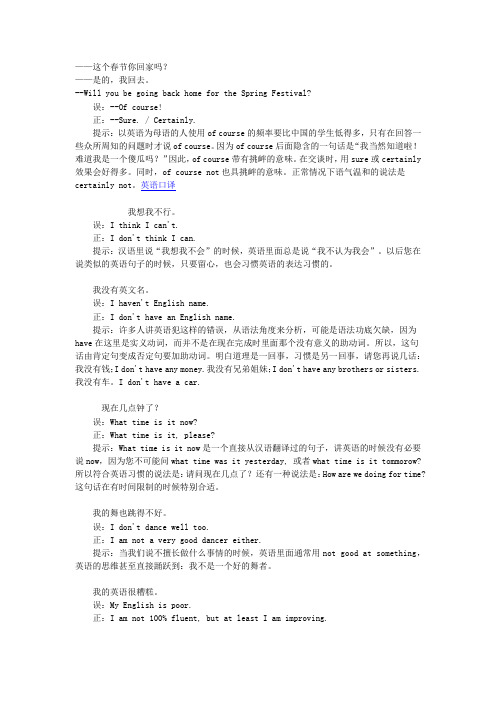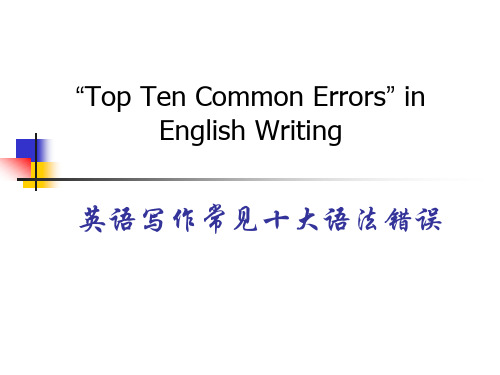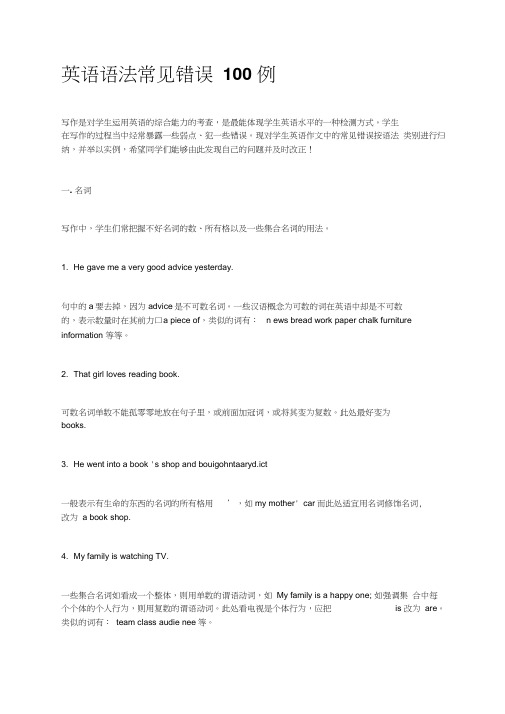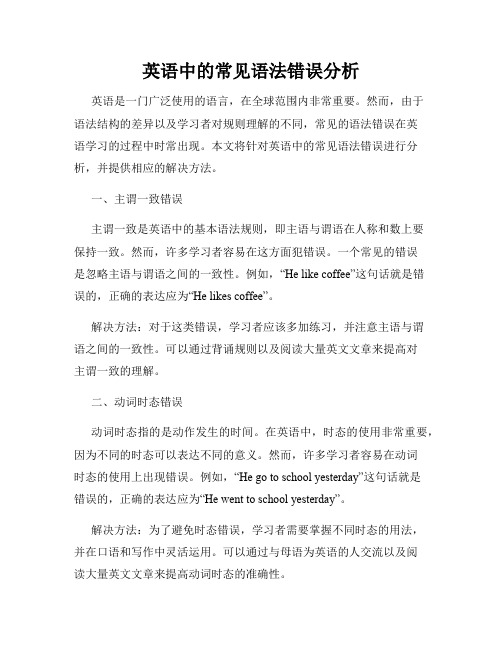最常见的英文语法错误
孩子经常犯的五个英语语法错误及如何改正

孩子经常犯的五个英语语法错误及如何改正英语作为全球通用语言,具备良好的语法基础对于孩子的学习成绩和沟通能力都起到至关重要的作用。
然而,很多孩子在学习英语语法时经常会犯一些错误。
本文将讨论孩子经常犯的五个英语语法错误,并提供相应的改正方法。
错误一:主谓一致错误主谓一致是指主语和谓语在人称和数上要保持一致。
许多孩子常常在这个方面犯错误,导致句子的语法结构不正确。
例如,他们可能会说:“He plays games everyday.” 正确的表达应该是:“He plays games every day.” 这里,第三人称单数主语“he”需要与动词“play”保持一致,加上“s”。
改正方法:为了帮助孩子改正这个错误,我们可以鼓励他们在书写和口语练习中更加注意主谓一致的规则。
此外,提供一些练习题目,帮助他们加强此类错误的纠正。
错误二:动词时态错误孩子们在使用正确的动词时态时也存在困惑,造成很多句子的时态混乱。
例如,他们可能会说:“I go to the park tomorrow.” 正确的表达应该是:“I will go to the park tomorrow.” 这里,应该使用将来时态。
改正方法:为了改正这个错误,我们可以通过例句和练习题目来帮助孩子理解各种时态的用法。
此外,老师和家长应该不断提醒孩子在表达中使用正确的时态。
错误三:冠词错误冠词在英语语法中扮演着重要的角色,但孩子们常常会在使用冠词时犯错。
例如,他们可能会说:“I want to eat apple.” 正确的表达应该是:“I want to eat an apple.” 这里,使用了不定冠词“an”来修饰以元音音素开头的单词“apple”。
改正方法:为了帮助孩子纠正冠词错误,我们可以通过口语练习和阅读练习来加强他们对于冠词的理解。
另外,提供相关的练习题目,帮助他们掌握冠词的正确使用。
错误四:时态一致错误时态一致是指句子中各动词的时态应该保持一致。
常见12个典型的英文错误

——这个春节你回家吗?——是的,我回去。
--Will you be going back home for the Spring Festival?误:--Of course!正:--Sure. / Certainly.提示:以英语为母语的人使用of course的频率要比中国的学生低得多,只有在回答一些众所周知的问题时才说of course。
因为of course后面隐含的一句话是“我当然知道啦!难道我是一个傻瓜吗?”因此,of course带有挑衅的意味。
在交谈时,用sure或certainly 效果会好得多。
同时,of course not也具挑衅的意味。
正常情况下语气温和的说法是certainly not。
英语口译我想我不行。
误:I think I can't.正:I don't think I can.提示:汉语里说“我想我不会”的时候,英语里面总是说“我不认为我会”。
以后您在说类似的英语句子的时候,只要留心,也会习惯英语的表达习惯的。
我没有英文名。
误:I haven't English name.正:I don't have an English name.提示:许多人讲英语犯这样的错误,从语法角度来分析,可能是语法功底欠缺,因为have在这里是实义动词,而并不是在现在完成时里面那个没有意义的助动词。
所以,这句话由肯定句变成否定句要加助动词。
明白道理是一回事,习惯是另一回事,请您再说几话:我没有钱;I don't have any money.我没有兄弟姐妹;I don't have any brothers or sisters.我没有车。
I don't have a car.现在几点钟了?误:What time is it now?正:What time is it, please?提示:What time is it now是一个直接从汉语翻译过的句子,讲英语的时候没有必要说now,因为您不可能问what time was it yesterday, 或者what time is it tommorow?所以符合英语习惯的说法是:请问现在几点了?还有一种说法是:How are we doing for time?这句话在有时间限制的时候特别合适。
英语写作常见十大语法错误

d.如果出现两个句子,中间除了用加连词这种方法之 外,还可以用标点符号分割,比如用句号或者分号。 句号和分号在语法上有连词的功能,其前后要有完整 的句子;而逗号、括号则不能够连接完整的句子。 Education has been made available to more people nowadays, however, many adults have some problems with literacy and numeracy. Education has been made available to more people nowadays; however, many adults have some problems with literacy and numeracy.
b.如果一个句子中出现多个谓语动词,要使用连词连接构 成并列动词,或者在一些句子中使用关系代词构成复合句。 有一些动词后面可以跟动词作宾语或者宾语补足语。 1. The media distorts reality, categories things as all good or all bad. The media distorts reality and categories things as all good or all bad. 2. Should we Chinese boycott Japanese Goods is hotly debated recently because of the territorial disputer for Diaoyu Islands. Whether we Chinese should boycott Japanese Goods is hotly debated recently because of the territorial disputer for Diaoyu Islands. 3.People think it is terrible that we stop buy Japanese goods. People think it is terrible that we stop buying Japanese goods.
英语语法常见错误100例

英语语法常见错误100 例写作是对学生运用英语的综合能力的考查,是最能体现学生英语水平的一种检测方式。
学生在写作的过程当中经常暴露一些弱点、犯一些错误。
现对学生英语作文中的常见错误按语法类别进行归纳,并举以实例,希望同学们能够由此发现自己的问题并及时改正!一. 名词写作中,学生们常把握不好名词的数、所有格以及一些集合名词的用法。
1. He gave me a very good advice yesterday.句中的a要去掉,因为advice是不可数名词。
一些汉语概念为可数的词在英语中却是不可数的,表示数量时在其前力口a piece of,类似的词有:n ews bread work paper chalk furniture information 等等。
2. That girl loves reading book.可数名词单数不能孤零零地放在句子里,或前面加冠词,或将其变为复数。
此处最好变为books.3. He went into a book 's shop and bouigohntaaryd.ict一般表示有生命的东西的名词的所有格用’,如my mother' car而此处适宜用名词修饰名词,改为 a book shop.4. My family is watching TV.一些集合名词如看成一个整体,则用单数的谓语动词,如My family is a happy one; 如强调集合中每个个体的个人行为,则用复数的谓语动词。
此处看电视是个体行为,应把is 改为are。
类似的词有:team class audie nee等。
5. I bought some potatos and tomatos at the supermarket.中学阶段以“o结尾的名词中有四个词变复数时要加es,它们是tomato potato Negro hero;其余的都加s变为复数。
常见英语语法错误及纠正方法

常见英语语法错误及纠正方法英语作为一门全球通用的语言,无论是在学术、商务还是日常交流中都起着举足轻重的作用。
然而,由于语法结构的复杂性,很多人在使用英语时常常犯一些常见的语法错误。
本文将介绍一些常见的英语语法错误,并提供相应的纠正方法。
一、主谓一致错误主谓一致错误是指主语和谓语动词在人称和数上不一致的错误。
这种错误常常发生在复数主语和单数谓语动词之间。
例如,错误的句子:“The students is studying for the exam.”正确的句子:“The students are studying for the exam.”纠正方法:在使用复数主语时,谓语动词应该使用复数形式。
二、冠词错误冠词错误是指对名词前的冠词使用不当的错误。
常见的冠词错误包括缺少冠词、错误使用冠词以及多余的冠词。
例如,错误的句子:“I have car.”正确的句子:“I have a car.”纠正方法:在使用可数名词时,通常需要加上不定冠词a或an。
另外,在特指某个名词时,需要使用定冠词the。
三、时态错误时态错误是指在句子中使用不正确的时态形式。
常见的时态错误包括混淆过去时和现在时、使用错误的进行时态以及误用完成时态等。
例如,错误的句子:“I go to the gym yesterday.”正确的句子:“I went to the gym yesterday.”纠正方法:根据句子的时间标志词和上下文,选择正确的时态形式。
过去的动作需要使用过去时态,现在正在进行的动作需要使用进行时态,而已经完成的动作需要使用完成时态。
四、动词形式错误动词形式错误是指动词的时态、语态、语气等形式使用不当的错误。
常见的动词形式错误包括错误的动词时态、错误的被动语态以及错误的情态动词等。
例如,错误的句子:“He have been invited to the party.”正确的句子:“He has been invited to the party.”纠正方法:根据句子的主语和时态,选择正确的动词形式。
英语作文常见典型语法错误归纳

英语作文常见典型语法错误归纳一、单词拼写错误1. 词形错误:例如:I have a dream to be a doctor when I grow up.正确:I have a dream to become a doctor when I grow up.2. 大小写错误:例如:I live in a small city called beijing.正确:I live in a small city called Beijing.3. 单复数错误:例如:He has two childs.正确:He has two children.4. 名词性物主代词错误:例如:This is her books.正确:This is her book.二、动词时态错误1. 一般现在时与一般过去时错用:例如:He go to school every day. 正确:He goes to school every day.2. 不定式与动名词错用:例如:I like to swimming.正确:I like swimming.三、词类错误1. 名词与形容词错用:例如:He is a happy man.正确:He is a happy person.2. 动词与名词错用:例如:He run very fast.正确:He runs very fast.3. 副词与形容词错用:例如:He speaks soft.正确:He speaks softly.四、介词错误1. 介词与动词错用:例如:She is good in English.正确:She is good at English.2. 介词与形容词错用:例如:She is interested to English. 正确:She is interested in English.。
英文写作语法检查

英文写作语法检查在英文写作中,合理运用语法是非常重要的。
下面是一些常见的语法错误,希望能对你有所帮助。
1.主谓不一致主谓不一致是指主语和谓语在人称和数上不相符合,例如:The boys plays soccer. (应该为:The boys play soccer.)2.动词时态错误动词时态错误是指动词的时态和文意不符,例如:Yesterday I am going to the park. (应该为:Yesterday I went to the park.)3.代词误用代词误用包括指代不清和代词的种类错误。
例如:He told she to meet him at the cafe. (应该为:He told her to meet him at the cafe.)4.冠词使用不当冠词使用不当是指冠词的使用和语境不符,例如:I want to buy a apple. (应该为:I want to buy an apple.)5.介词误用介词误用是指介词使用和语境不符,例如:I am proud of my self. (应该为:I am proud of myself.)6.形容词和副词误用形容词和副词的误用包括形容词或副词的选用错误、位置错误或未加比较等。
例如:He runs more faster than me. (应该为:He runs faster than me.)7.平行结构错误平行结构错误是指平行的语句结构不一致或不完整。
例如:My favorite hobbies are singing, to dance and to draw. (应该为:My favorite hobbies are singing, dancing, and drawing.)8.句子结构混乱句子结构混乱是指句子结构不明确或句子成分丢失。
例如:Having finished the exam, my phone rang. (应该为:Having finished the exam, I answered my phone.)以上是常见的语法错误,通过认真学习和实践,我们可以逐步提高自己的英文写作水平。
英语中的常见语法错误分析

英语中的常见语法错误分析英语是一门广泛使用的语言,在全球范围内非常重要。
然而,由于语法结构的差异以及学习者对规则理解的不同,常见的语法错误在英语学习的过程中时常出现。
本文将针对英语中的常见语法错误进行分析,并提供相应的解决方法。
一、主谓一致错误主谓一致是英语中的基本语法规则,即主语与谓语在人称和数上要保持一致。
然而,许多学习者容易在这方面犯错误。
一个常见的错误是忽略主语与谓语之间的一致性。
例如,“He like coffee”这句话就是错误的,正确的表达应为“He likes coffee”。
解决方法:对于这类错误,学习者应该多加练习,并注意主语与谓语之间的一致性。
可以通过背诵规则以及阅读大量英文文章来提高对主谓一致的理解。
二、动词时态错误动词时态指的是动作发生的时间。
在英语中,时态的使用非常重要,因为不同的时态可以表达不同的意义。
然而,许多学习者容易在动词时态的使用上出现错误。
例如,“He go to school yesterday”这句话就是错误的,正确的表达应为“He went to school yesterday”。
解决方法:为了避免时态错误,学习者需要掌握不同时态的用法,并在口语和写作中灵活运用。
可以通过与母语为英语的人交流以及阅读大量英文文章来提高动词时态的准确性。
三、冠词错误冠词是英语中常见的语法错误源之一。
很多学习者在冠词的使用上容易混淆,例如使用"a"代替"an",或者省略冠词。
这样的错误会对句子的语义产生混淆。
例如,“I have cat”这句话就是错误的,正确的表达应为“I have a cat”。
解决方法:为了避免冠词错误,学习者需要掌握冠词的基本规则,并在实际运用中进行练习。
可以通过参考英语语法书籍、网络资源以及请教英语母语为人的帮助来提高冠词的准确性。
四、单复数错误单复数错误是英语学习者普遍存在的问题。
学习者常常犯的错误是在句子中使用单数形式代替复数形式,或者相反。
- 1、下载文档前请自行甄别文档内容的完整性,平台不提供额外的编辑、内容补充、找答案等附加服务。
- 2、"仅部分预览"的文档,不可在线预览部分如存在完整性等问题,可反馈申请退款(可完整预览的文档不适用该条件!)。
- 3、如文档侵犯您的权益,请联系客服反馈,我们会尽快为您处理(人工客服工作时间:9:00-18:30)。
最常见的英文语法错误The most common grammar mistake involves the ability to count. Fortunately, you only have to be able to count higher than 1.If I write, "A man buys a house," you can count the number of men: 1.If I write, "Men buy houses," you need to count higher than 1 because this sentence describes more than 1 man.Now, let's look at these two samples more carefully.In the first sentence, "A man buys a house," the subject is 1 man, described as "a man." The verb "buys" ends with the letter "s." When we conjugate verbs in the present tense, we can see that verbs for the third person singular end with the letter "s."First person, singular subject: "I buy."Second person, singular subject: "You buy."Third person, singular subject: "He buys." (Notice the "s" at the end of the verb.)What we have just learned is that if the subject is singular, the verb is also singular, meaning only one person or thing. Also, we see that the verb has an "s."In the second sentence, "Men buy houses," we have more than 1 man, described as "men." The subject is plural (more than 1), and the verb no longer has the "s."And this is where we get the most common grammar mistake. The most common grammar mistake is to use a singular subject (one person or thing) with a verb in the third person singular (the verb has the "s") but then refer to the subject with a plural pronoun.Perhaps an example will help here. Let's build a sentence part by part, and see what is happening.Start of incorrect sentence: "Everyone" - This is 1 person because it refers to each individual person, so it is singular.Continuing incorrect sentence: "Everyone needs" - We added the third person singular verb, which has an "s."Ending incorrect sentence: "to spend their money wisely." -The pronoun in this part is"their," and it refers to the subject, "Everyone." "Their" is a plural subject, which means it refers to more than 1 person.Here is the complete sentence with the grammar mistake: "Everyone needs to spend their money wisely." This sentence has a singular subject, a singular verb, and a plural pronoun. The problem is the pronoun.For correct grammar, the pronoun needs to be plural or singular depending on the word it refers to. If it refers to a singular person or thing, it needs to be singular. If it refers to more than one person or thing, it, too, needs to be plural.The correct pronoun that can refer to "everyone" in this sample are "his," "her," "its," and "whose." These are all singular pronouns because they refer to 1 person or thing.This morning, I was reading one of my favorite blogs, The Motley Fool, and I came across this sentence: "Third, for someone who wants to maximize their time... "The faulty sentence contains a singular subject, "who." We know "who" is singular because it refers to "someone," which is singular. We also know it is singular because it has a singular verb: "wants." The verb ends in "s," so it is third person singular.Thus, the sentence has a singular subject and a singular verb. Then we see the pronoun "their." The pronoun is not singular; it refers to more than 1 person. And this is the most common grammar error.To refer to the singular subject, the pronoun needs to be singular, too. If we only change the pronoun to correct this sentence, we get these options."Third, for someone who wants to maximize his time... " (This is correct, but some people think using "his" is sexist, so this isn't a good option.)"Third, for someone who wants to maximize her time... " (Same problem as the previous correction.)"Third, for someone who wants to maximize its time... " (This doesn't make sense. We don't use "its" to refer to people.)"Third, for someone who wants to maximize whose time... " (This also doesn't make sense.)So what are we to do? Correcting the grammar error is simple.If we want to use a plural pronoun, we need to have a plural subject and verb. Thus, we can change "someone" to "people" and change "wants" to "want." Here is the correct sentence:"Third, for people who want to maximize their time... "Now, the subject "who" is plural. We know it is plural because it refers to the "people." "People" is plural because it describes more than one person. We also know it is plural because its verb is "want," which no longer contains the "s."A plural pronoun ("their") can only refer to a plural subject ("who") that has a plural verb ("want"). Now that we have a plural subject and a plural pronoun, the sentence is correct.Here's the advice: if you use a plural pronoun, such as "they," "their," and "them," check the word it refers to. If the pronoun refers to more than 1 thing, it is correct. If it refers to 1 thing, the pronoun is incorrect, and you have made the most common grammar error.You can fix this error two ways:1. Make the pronoun singular ("Third, for someone who wants to maximize his time... ") or2. Change the word the pronoun refers to so that the pronoun refers to more than one thing ("Third, for people who want to maximize their time... ")。
